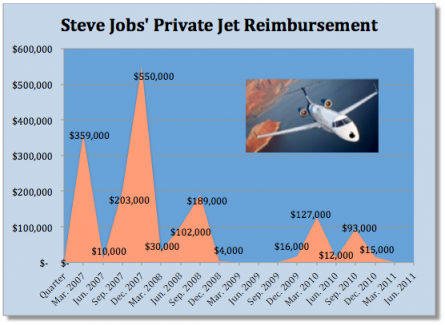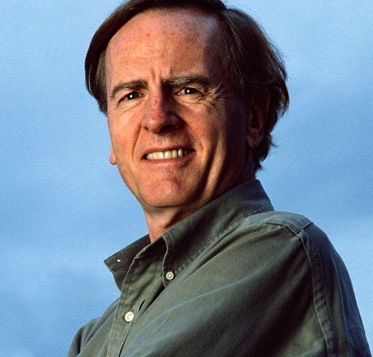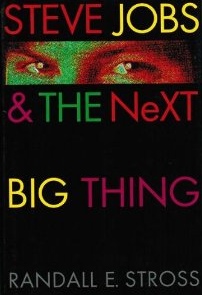Posts filed under 'Management'
July 2011 Steve Jobs news roundup
23 Jul 2011 | in Management, Steve Jobs history, Steve Jobs news, Steve Jobs personality, Steve Jobs trivia
Busy month for me, hopefully Steve Jobs news have been somewhat slow too (apart from last week’s).
Here’s what I put aside for you:
- July 9: A weird video surfaces from Taiwan. A tea brand shamelessly used an actor to play Steve Jobs and sell bottled tea in a TV commercial. See for yourself:

(via Cult of Mac)
- July 8: French magazine Le Point reveals that Steve almost purchased a castle in the South-East of France. Pictured below, the property is valued at around €25m ($36m). Apparently Steve’s wife, Laurene, toured the property herself.

The article also relates that back in 1985, Jean-Jacques Servan-Schreiber, a French journalist close to President Francois Mitterrand, apparently asked of the head of state a special present to Steve Jobs for his 30th birthday. I’ve read many stories about that famed birthday, where tons of celebrities attended, including Ella Fitzgerald who was the party singer. Anyway, JJSS (as he is often called) reportedly suggested that the French nationality was offered to the Apple co-founder as a special gift. The French President nonchalantly refused. I think Steve would have appreciated the gift, as he has often testified of his love of France (I have made a compilation of the many times he uses France in Apple demos).
- July 11: a new Tshirt made it to the Apple Gift shop in Cupertino… making fun of the company’s cult of secrecy. I’m buying it next time I go there! (via Macrumors).

- July 21: John Gruber of Daring Fireball spotted a nice anecdote about Steve and his legendary curtesy. I am quoting the same thing he did:
The story goes that ESPN president George Bodenheimer attended the first Disney board meeting in Orlando, Florida, just after the company had bought Pixar, the innovative animation factory, and spotted Apple CEO Steve Jobs in a hallway. It seemed like a good time to introduce himself. “I am George Bodenheimer,” he said to Jobs. “I run ESPN.” Jobs just looked at him and said nothing other than “Your phone is the dumbest fucking idea I have ever heard,” then turned and walked away.
- July 21: Philip Elmer-Dewitt dug out a nice chart that compiles all the public data about Apple’s reiumbursements of the expenses of Steve’s famed private jet airplane. I think it is worth mentioning that Steve can use the jet for his personal use, but then of course the company doesn’t reiumburse him of the cost of operating it. The chart is below:

- July 23: after all the nonsense we’ve come to read about Steve’s succession lately (which did grant us a new Steve Jobs quote: “it’s hogwash”, courtesy of the Wall Street Journal) — John Gruber wrote a very good article, the kind that only he knows how to write, on the topic: On Succeeding Steve Jobs. His conclusion: “the obvious structure for a post-Jobs Apple is simply Apple as we know it, without Steve Jobs.” I believe he is 100% right and that’s what we will see, perhaps as early as next year. BUT, and it’s a big BUT, I am not sure Tim Cook can keep the fire alive as Steve did for the next decade. And as I’ve stated before, I think he will have trouble running the company unchallenged the way only the genius-founder Steve Jobs can. His authority to run the super-disciplined fruit company will probably be challenged a couple of years after Steve is gone… Time will tell.
John Sculley loves Steve Jobs

John Sculley met with Cult of Mac chief editor Leander Kahney for an extensive interview about his tenure at Apple and his views on Steve Jobs.
John Sculley on Steve Jobs, the full interview
If you have time, I suggest you read it. But I wouldn’t go as far as John Gruber and call it “fascinating”. For one I didn’t learn anything, apart from a couple of anecdotes. But most importantly, it confirms what I thought of John Sculley. He is a bitter old man who regrets what he’s done to Apple and Steve. The lengths to which he goes to show how much he loves Steve are so great it’s ridiculous. Examples:
It’s okay to be driven a little crazy by someone who is so consistently right.
I don’t take any credit for it. What Steve’s brilliance is, is his ability to see something and then understand it and then figure out how to put into the context of his design methodology — everything is design.
All the design ideas were clearly Steve’s. The one who should really be given credit for all that stuff while I was there is really Steve.
The there’s the part where he sounds like an ex lover:
Q: People say he killed the Newton – your pet project – out of revenge. Do you think he did it for revenge?
Sculley: Probably. He won’t talk to me, so I don’t know.
Same goes for the Bloomberg interview where he speaks of Steve seducing him to make him come to Apple: “He had dark, long hair at this time”… All of this reminded me of this old Fake Steve post, which, once more, though intended as hilarious, is in fact quite realistic.
The one point I did find interesting in the Kahney interview was how he describes how power was distributed at Apple:
Remember, he was the chairman of the board, the largest shareholder and he ran the Macintosh division, so he was above me and below me. It was a little bit of a façade and my guess is that we never would have had the breakup if the board had done a better job of thinking through not just how do we get a CEO to come and join the company that Steve will approve of, but how do we make sure that we create a situation where this thing is going to be successful over time?
I had never thought of it before. Mainly because Steve being “chairman of the board” was just a title for PR, and did not reflect his true role at Apple. Otherwise, Jobs could have imposed himself as a CEO. And I never knew he was still the largest shareholder either. Anyway, I totally disagree on his idea that Steve shouldn’t have been fired, because as I’ve stated before it is probably the best thing that ever happened to him — we wouldn’t have Pixar otherwise.
Finally, here’s an anecdote I found funny:
Sometimes… he was wrong tactically on a number of things. He wouldn’t put a hard drive in the Macintosh. When someone asked him about communications, he just threw a little disk across the room and said, “That’s all we’ll ever need.”
It’s the only part where John Sculley admits Steve can be wrong once in a while…
Has NeXT changed Steve Jobs?
 Randall E Stross wrote an article three days ago in the New York Times, that you hear a good deal about in most of the Apple blogosphere. Its title: “What Steve Jobs learned in the Wilderness“. I’ll add my two cents worth, as usual.
Randall E Stross wrote an article three days ago in the New York Times, that you hear a good deal about in most of the Apple blogosphere. Its title: “What Steve Jobs learned in the Wilderness“. I’ll add my two cents worth, as usual.
First, a word on Randall. The guy knows what he’s talking about, since, as he points out in the article, he wrote Steve Jobs and the NeXT Big Thing over 15 years ago. I read the book some time ago and liked it a lot. It’s a great resource on the obscure NeXT period (one I love, as you know or will soon know if you keep coming back to this blog). What Mr. Stross doesn’t brag about, understandingly, is that his main point in the book was that Steve Jobs was basically a fluke with no management skills and vision on the industry whatsoever. He thought that not only NeXT but also Pixar, where his wife worked, both proved it. Hmm.
Now about the article itself. Quite frankly, I have mixed feelings about it. It’s true that Steve was kind of humbled by his failure at NeXT. But, unlike what the article says, I don’t believe that this newfound humbleness has remained with him all these years. I agree more with Alan Deutschman’s theory in The Second Coming of Steve Jobs that once success came back, Steve Jobs’ “mellowness” was quick to disappear. I especially disagree with Randall Stross’ statement:
In this period, Mr. Jobs did not do much delegating. Almost every aspect of the machine — including the finish on interior screws — was his domain. (…) Mr. Jobs had learned from Next not to try to do everything himself.
This shows quite a lack of understanding of how Apple is run. Last time I checked, Steve delayed the launch of the iPad until he could find the appropriate word to describe it (namely, “magical”), chooses the music that’s used in every Apple commercial — and, yes, still cares a great deal about screws. Just listen to the keynotes or promotional videos for the iPhone or the Macbook Pro, how they insist on the number of screws (or the lack thereof) in the machines, with the very same words that were used by Steve when he launched the NeXT Station… in 1991.
As I’ve pointed out before, the main difference between Steve’s failures in the 1990s and his successes in the 2000s is not Steve himself. It’s… LUCK. And a market finally ready for his vision.
Who will succeed to Steve Jobs?
Interesting article I stumbled upon today, from a Jon Korbin on EzineMark.com. It deals with what I think is one of the most controversial issues for Apple in the future: the succession of Steve Jobs.
The 2-part article starts with a highly dithyrambic description of Steve’s role at Apple, one even your fellow webmaster would not dare write. Excerpt:
He has erected temples to Apple’s greatness in major cities around the world whose awesome presence evokes imagery of high priests and virgins surrounded by platinum chalices spilling over with grapes on the vine.
My attention was caught by the following two points in the article — they reflect my two main concerns about a Steve-less Apple. First, the control that only Steve can have a huge corporation like Apple.
His intimidating sense of control has afforded him the kind of command over this ever-growing audience that seldom belongs to individuals who don’t draw their power from Government or God.
The author is referring to Apple fanboys like us. But this is not the issue. The issue is about Apple itself. (more…)
Sycophantic article about Steve on the Telegraph website
22 Sep 2010 | in Management
The Telegraph posted an article today that sings the praises of Apple’s CEO. It is for a broad audience and therefore we, knowledgeable people, will learn nothing from it. However I am still posting about it to illustrate my point in the previous post regarding how common it is to praise Steve nowadays. I will try and find an article from 10-15 years ago to make the contrast more apparent.
For a change, there aren’t that many errors in the article, except for the description of Jony Ive, who is described as the designer behind Apple’s computer and iPod range” instead of the head designer behind every piece of hardware that has come out of Cupertino for the last 13 years.